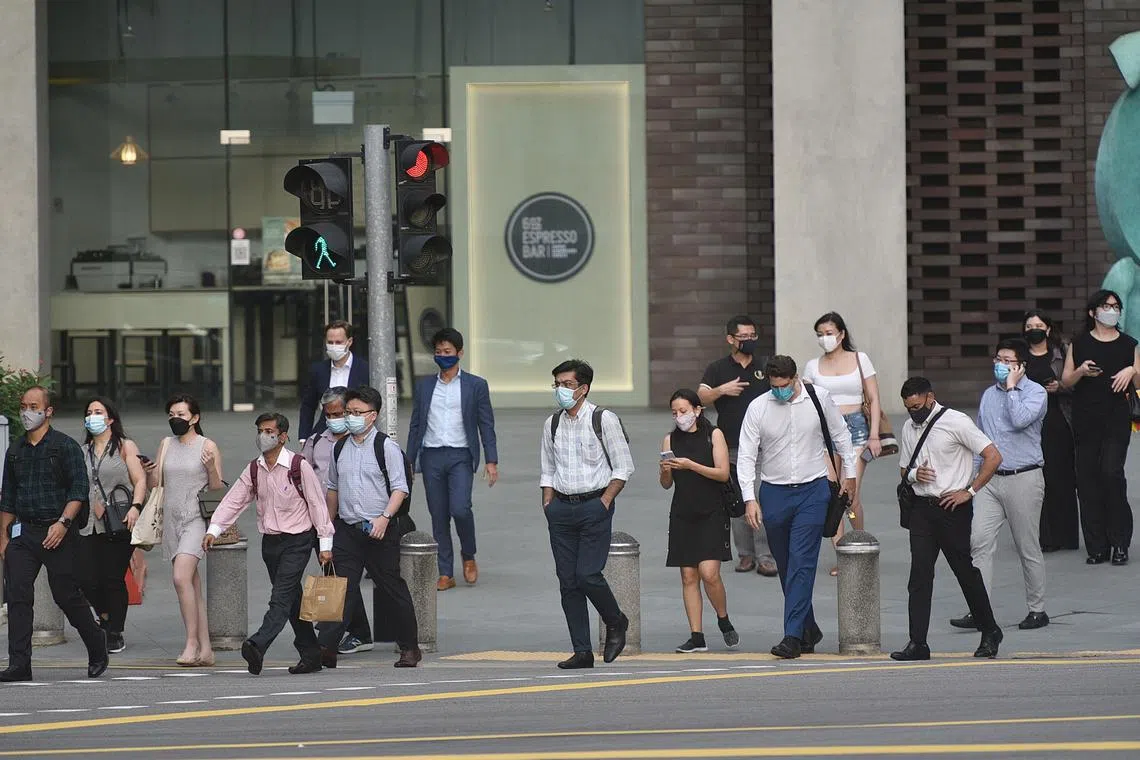Employers should raise salaries in ‘fair and sustainable’ way amid inflation, uncertainties: NWC
Sign up now: Get ST's newsletters delivered to your inbox

The council also set out wage guidelines for lower-wage workers in a bid to narrow the income gap.
ST PHOTO: DESMOND WEE
Follow topic:
SINGAPORE – As inflation continues to eat away at each dollar and push up the cost of living, the National Wages Council (NWC) has called on employers to raise salaries for employees in guidelines released on Monday.
At the same time, it said it recognises that businesses are facing rising costs and uncertain business prospects, and so any wage increases should be “fair and sustainable”.
The tripartite body, comprising representatives from employers, trade unions and the Government, also set out wage guidelines for lower-wage workers in a bid to narrow the income gap.
In general, employers that have done well and have good business prospects should reward their staff with built-in wage increases and variable payments that are in line with their contributions. If the company hires lower-wage workers, they should receive a pay rise at the upper band of 5.5 per cent to 7.5 per cent of their gross monthly wage, or at least $80 to $100, whichever is higher.
Employers that have done well but face uncertain business prospects may moderate built-in wage increases, but they should still reward employees with variable payments, the NWC said.
Meanwhile, lower-wage workers should get a built-in wage increase at the lower to middle band of the 5.5 per cent to 7.5 per cent range.
Lastly, employers that have not done well may exercise wage restraint, with the management leading by example. Lower-wage workers should get a built-in wage rise at the lower band of the 5.5 per cent to 7.5 per cent range of their gross monthly wage.
The guidelines for lower-wage workers apply to those who are earning a gross monthly wage of up to $2,200, which covers about a fifth of full-time employed residents.
The NWC said employers should seek to ensure greater income stability for these workers by putting in place sustainable growth in their basic wages. It also called on employers to provide higher percentage wage increases for workers who are earning comparatively lower wages.
Employers can tap the Progressive Wage Credit Scheme
In coming up with the guidelines, the NWC noted that employees had taken wage cuts or freezes and supported other cost-cutting measures, and it said it is thus only fair that they are duly compensated when the economy picks up.
National Trades Union Congress president Mary Liew said “employers should recognise employees’ contributions over the last two years, particularly those in the hardest-hit sectors, who may have taken wage cuts during the Covid-19 pandemic”.
NTUC deputy secretary-general Desmond Tan urged employers to also factor in the current inflation rates when they make wage increment decisions so as “to ensure real income growth for our workers”.
Inflation in Singapore is at its highest levels in over a decade,
The guidelines, which cover the period from Dec 1 to Nov 30 next year, also called for employers to implement the flexible wage system if they have not done so. This is because economic uncertainties ahead underscore the need for resilience and flexibility in wage structures, noted the NWC.
A flexible wage system includes a fixed component, which is the fixed basic monthly pay, and the variable component, which includes a monthly variable component or an annual variable component, built into the gross salary.
This will ensure employers can restore wages quickly when business recovers, or cut wages during periods of economic uncertainty. It also gives employees greater job security as companies can cut costs instead of jobs.
Mr Lim Wen Sheng, deputy general secretary of the Food, Drinks and Allied Workers Union, which represents employees in accommodation, food manufacturing, food retail and food services, said all companies should reward workers with a fair wage adjustment and variable payment to help them cope with rising inflation.
The NWC said that as wages pick up, productivity has to go up to justify the rise in wages, and while productivity has increased in the first half of 2022, employers should continue with business transformation and job redesign initiatives.
Labour productivity, as measured by real value-added per actual hours worked, has also improved by 1.5 per cent on a yearly basis in the first half of 2022.
Dr Robert Yap, president of the Singapore National Employers Federation, said the momentum of business transformation had accelerated during the pandemic.
Employers should push on to remain competitive, he said, adding that workers also have to upskill and reskill constantly and consistently to keep pace with the changes.


